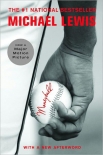Moneyball by Lewis, Michael (books to read in your 30s TXT) 📗

Book online «Moneyball by Lewis, Michael (books to read in your 30s TXT) 📗». Author Lewis, Michael
His pitching coach is trying to teach Chad how to go inside. After one of his weak outings, when he was looking lost, Peterson had made him sit down and watch tape of himself slicing and dicing big league hitters for the first five months of the season. As Chad watched the tape of his old self, Peterson made his point.
“You’re a Christian, right, Chad?”
“Yeah.”
“You believe in Jesus?”
“Yeah.”
“Have you ever seen him?”
“No, I’ve never seen him.”
“Ever seen yourself get hitters out?”
“Yeah.”
“So why the fuck do you have faith in Jesus when you never seen him, but you don’t have faith in your ability to get hitters out when you get hitters out all the time?”
His coach left him with that thought. Chad sat there and said to himself: “Okay. That makes sense.” But a little while later the doubts returned. For his entire career hardly anyone has believed in him and now that they do, he can’t quite believe in himself. “It’s my greatest weakness,” he said. “I have zero self-confidence. The only way I can explain it is that I’m not the guy who throws ninety-five miles an hour. The guy who throws ninety-five can always see his talent. But I don’t have that. My stuff depends on deception. For it to work, there’s so much that has to go right. When it starts not going right, I think, ‘Oh my gosh, I hope I can keep foolin’ em.’ Then I start to ask, ‘How much longer can I keep foolin em?’”
He’s having—with him, there isn’t a more accurate way to put it—a crisis of faith. When he knows, he always hits his spots; when he hopes, he never does; and he’s now just hoping. Oblivious to how good he is, he is susceptible to the argument that his success is a trick, or a fluke, or a spell that at any moment might break. He doesn’t much care that he is, for the first time in his miraculous career, the only one still making this argument.
That night in early September he’s fighting himself more fiercely than ever before. Billy Beane knows it. His cheap out-getting machine has a programming glitch. He has no idea how to fix it—how to get inside Chad Bradford’s head. Sloth, indolence, a lack of discipline, an insufficient fear of management—these problems Billy knows how to attack. Insecurity is beyond him. If he knew how to solve the problem, he might be finishing up his playing career and preparing himself for election to the Hall of Fame. But he still doesn’t know; and it worries him. Chad doesn’t know that he will retire batters at such a predictable rate, in such a predictable way, that he might as well be a robot. As a result, he might not do it.
Billy Beane only watches all of what happens next because he’s somehow allowed himself to be trapped into watching the game with me. What happens next is that Chad Bradford shows the world how quickly a big lead in baseball can be lost. He gets the final out in the seventh inning, on a ground ball. The eighth inning is the problem. Art Howe allows Chad to return to the mound to face a series of left-handed hitters.
“I’m glad Art’s leaving him in,” says Billy. “He’s wasted if you only use him to get an out.”
I ask if it worries him that Chad relies so heavily on faith. That Chad’s genuine, understandable belief that the Good Lord must be responsible for his fantastic ability to get big league hitters out leaves him open to the suspicion that the Good Lord might have changed His mind.
“No,” says Billy. “I’m a believer, too. I just happen to believe in the power of the ground ball.”
In nearly seventy relief appearances this year Chad Bradford has walked exactly ten batters, about one every thirty he has faced. He opens the eighth inning by walking Brent Mayne.
As Mayne trots down to first base, the Oakland crowd stirs and hollers. Someone from the center field bleachers hurls a roll of toilet paper onto the field. It takes a minute to clear, leaving Chad time with his hellish thoughts. When play resumes, fifty-five thousand people rise up and bang and shout, perhaps thinking this will help Chad to settle down.
“Why should noise have any more effect on the hitter than the pitcher?” says Billy, a bit testily. “If you’re playing away, you just pretend they are cheering for you.”
Chad walks the second hitter, Dee Brown. It’s the first time all year he’s walked two batters in a row. The TV cameras pan to Miguel Tejada and second baseman Mark Ellis, conferring behind their gloves.
“In the last ten years guys started covering their lips with their gloves,” snaps Billy. “I’ve never known a single lip-reader in baseball. What, has there been a rash of lip-reading I don’t know about?”
The third batter, Neifi Perez, hits a slow ground ball to the second baseman. John Mabry, playing first, races across and cuts it off. Chad just stands on the mound and watches the play





Comments (0)